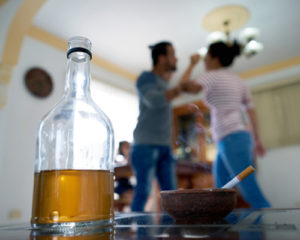Alcoholism in a marriage can be one of the most deeply troubling problems for a spouse to deal with. Being loving toward your partner while firm about protecting yourself and your children requires a lot of courage, patience, and help.
The best thing you can do is help your spouse get treatment. Alcoholism, also known as alcohol use disorder (AUD), requires comprehensive recovery support. Though it can’t be cured, it can be effectively managed for life.
Effects of Alcoholism on Spouse
If you fear that your spouse is struggling with alcoholism, there are very clear signs that result from their drinking problem. These include:
A strong compulsion to drink, well above casual or even moderate alcohol consumption. If your husband or wife insists on drinking every day, invents reasons to drink, or makes alcohol a regular part of their normal life, this suggests that they are incapable of going without alcohol.
Withdrawal symptoms, where going without alcohol for any period causes severe physical and psychological distress. Moderate drinkers can discontinue their alcohol consumption without suffering any ill effects, but if your spouse becomes anxious, irritable, depressed, or experiences headaches, insomnia, increased heart rate, and high blood pressure because they have not had a drink in a while, this is almost certainly a sign that they have become dependent on alcohol.
Increased tolerance for alcohol. Many people need only a small amount of alcohol to feel its pleasantly intoxicating effects, but a person who drinks too much gets so used to alcohol in their system that they have to drink excessive amounts to experience any level of pleasure. If your spouse has to knock back multiple drinks to just get buzzed and insists on drinking to the point of intoxication, this could be a very big warning sign of an alcoholism problem.
Denial and Shame
Following from this, if your spouse refuses to stop drinking, this can confirm the presence of alcoholism. Lots of people can recognize the signs that their consumption has become excessive, and they either stop drinking for the night or can go weeks (or even longer) without drinking. They may also stop at the behest of their loved ones.
Someone dependent on alcohol will strongly reject any evidence that their drinking has become problematic. They will refuse to accede to their spouse’s request to discontinue drinking, or they will agree but then continue to drink in secret. If you and your spouse have regular arguments about their drinking and the situation does not change, this can suggest that they are struggling with alcohol abuse.

Conversely and yet logically, a person who is ashamed of drinking is also displaying a sign of alcoholism. People who have no issues with alcohol generally don’t try to hide their drinking habits from friends and loved ones. Those who do, however, know that their drinking is a source of strife, but they are still compelled to continue drinking. They will do so in secret and try to destroy any evidence of their behavior. There may be guilt about their drinking habits, which they try to self-medicate by drinking more and end up compounding the problem.
If these behaviors are repeated over time, that could confirm that your loved one is dealing with alcoholism.
How to Deal With an Alcoholic Spouse
In many cases, the spouses of alcoholics are not sure how to properly and safely live with their loved ones. They love their husband or wife and feel a marital duty to support them. This may be tempered with anger and disappointment at how alcoholism has negatively affected their marriage, their individual lives, and the lives of their children and extended family.
A lot of spouses stay in their marriage and suffer quietly, afraid of saying or doing anything that will exacerbate the problem. There may be legitimate fear that confronting the problem will put them, their future, and their family in harm’s way.
You might experience your own negative thoughts and behaviors. These include blaming yourself for the problem, such as thinking that you pushed your husband or wife to drink or that you didn’t do enough to stop them. The reality of the matter is that if your spouse is psychologically dependent on alcohol, they will drink regardless of your words or actions. There may be some behaviors that you can change in recovery, but their alcohol use disorder is not your responsibility.
Taking It Personally and Enabling
You also may take their relapses personally, like the failure to stay sober is your fault. However, Psychology Today points out that relapse is not a sign of failure, and it is part of recovery. As many as 90 percent of people in recovery experience some kind of slip, and it is fairly rare (although not impossible) for someone to leave a treatment program and never touch any substance ever again.
Recovery can be a source of stress in and of itself, and the temptation to fall back on a destructive habit — especially when that habit is drinking alcohol, which is so widely available — is a natural one.
If your husband or wife goes back to drinking, this does not mean their recovery is a failure, and that you, by extension, have failed. It only means they’ve hit one of the many expected bumps in the road of sobriety. This presents an opportunity for both of you to reconnect with a support group or therapist and relearn the tools and skills necessary to support a sober marriage.
Many spouses also attempt to control their loved one’s drinking, but without proper training and medical rehabilitation, this kind of personal intervention is fraught with pitfalls for both parties.

Some spouses may be tempted to cover up the problem. They may be in denial about their loved one’s alcoholism, so they unintentionally enable the drinking behavior. This can include making excuses for their spouse, hiding evidence of alcoholism, or otherwise allowing it to continue unchecked.
It is very understandable for a concerned husband or wife to engage in these behaviors. They are often distraught at seeing the effects of alcoholism in the person they love, and there might be extreme confusion and uncertainty on how to respond. But it is important to know that you might be hurting yourself, your spouse, and your children if you attempt to maintain the status quo.
How to Help Your Alcoholic Husband or Wife
Both individuals in the relationship can heal themselves and each other by being honest and getting professional help.
What can you do when your husband or wife is struggling with alcoholism? The actions you can take are not easy, but they can be fundamentally important to saving your marriage and the well-being of everyone in the family. To help your loved one, you can start by confiding in a therapist, a social worker, a spiritual or religious counsel, or a trusted friend or family member.
“When the time comes to talk to your spouse about their drinking, it is best to rehearse being honest, open, and loving. It is of paramount importance to remain calm during the conversation. Practicing with someone you trust, who can give you unambiguous feedback about the clarity of your message, will help you stay away from blaming and shaming your spouse. ”
Clarity and Commitment to Change
When your spouse is confronted with the consequences of their alcoholism, they may react by lashing out, denying the problem, or being uncommunicative. If this happens, stay focused on the problem at hand, and keep your approach straightforward and clear. This is easier said than done, so working with someone who can support you emotionally (maybe even having that person present during the intervention) will give you the strength you need to keep the healing of the relationship as your primary goal.
A key part of helping your alcoholic spouse is your commitment to change. This could mean sticking to established boundaries (no more drinking in the house, for example) or identified ways you will change your own behavior to help your loved one’s sobriety. It might also mean moving out or asking your spouse to move out.
Whatever change you want to make and see, it is important to carry it out. To better deliver the message that you will not accept their drinking anymore, you have to be ready to enforce the changes, no matter how difficult or disappointing they may be.
Help For the Whole Family
When your spouse is struggling with alcoholism, it is vital to get help for the whole family. Your husband or wife will need to enroll in a professional detoxification and rehabilitation program, but it is of equal importance that you and your children are also part of the process.
Children and close family members can greatly benefit from family therapy, which focuses on helping relationships to heal and improve. Family therapy is an integral component of successful alcoholism treatment. If any issues indirectly played a role in your spouse’s alcoholism, family therapy will bring those issues to light and give all of you the tools and skills to cope with them.
This is especially relevant in redressing the damage that has been done during your spouse’s addiction. Working with a family therapist will help you, your partner, and your children learn how to bond again, how to make space for each other, and how to work with the critical need for sobriety and mental health well-being. This will allow every member of the family to preserve their own mental health and better support each other.
Growing Together in Recovery
Psych Central observes that alcoholism in a marriage can cause deep hurt, pain, and resentment. Those feelings are important, and they should be addressed — not in arguments and shouting but through therapy and rehabilitation for both partners.
Acknowledging that your husband or wife is dealing with alcoholism can be one of the hardest things you have to do in your marriage; however, it is absolutely necessary to save your marriage. Being honest and communicative about the need for professional help is the first step to helping your loved one.
Do I Have An Alcohol Problem? WebMD. from https://www.webmd.com/mental-health/addiction/understanding-alcohol-abuse-symptoms
What is Alcohol Withdrawal Syndrome? Healthline. from https://www.healthline.com/health/alcoholism/withdrawal
Alcohol Releases the Brain’s “Feel-Good” Chemicals. LiveScience. from https://www.livescience.com/36084-alcohol-releases-endorphins-brain.html
Denial as a Symptom of Alcoholism. Very Well Mind. from https://www.verywellmind.com/denial-a-symptom-of-alcoholism-63296
Spouse’s Secret Drinking Is an Emergency. Washington Post. from https://www.washingtonpost.com/lifestyle/style/spouses-secret-drinking-is-an-emergency/2016/08/19/f3d1dc4a-6647-11e6-8b27-bb8ba39497a2_story.html?noredirect=on&utm_term=.272db82f2eb8
10 Things To Stop Doing If You Love An Alcoholic. Verywell Mind. from https://www.verywellmind.com/things-to-stop-if-you-love-an-alcoholic-67300
Why Relapse Isn’t a Sign of Failure. Psychology Today. from https://www.psychologytoday.com/us/blog/where-science-meets-the-steps/201210/why-relapse-isnt-sign-failure
How to Help Someone With An Alcohol Addiction. Healthline. from https://www.healthline.com/health/most-important-things-you-can-do-help-alcoholic
How a Family Alcoholism Intervention Works. Verywell Mind. from https://www.verywellmind.com/family-intervention-how-it-works-63299
Alcoholism: Treating the Family as a Whole. The New York Times. from https://www.nytimes.com/1982/12/08/garden/alcoholism-treating-the-family-as-a-whole.html
Addiction Treatment Should Include Family Therapy. Verywell Mind. from https://www.verywellmind.com/addiction-treatment-should-include-family-therapy-67293
How To Talk To Your Alcoholic Partner. Psych Central. from https://psychcentral.com/lib/how-to-talk-to-your-alcoholic-partner/


